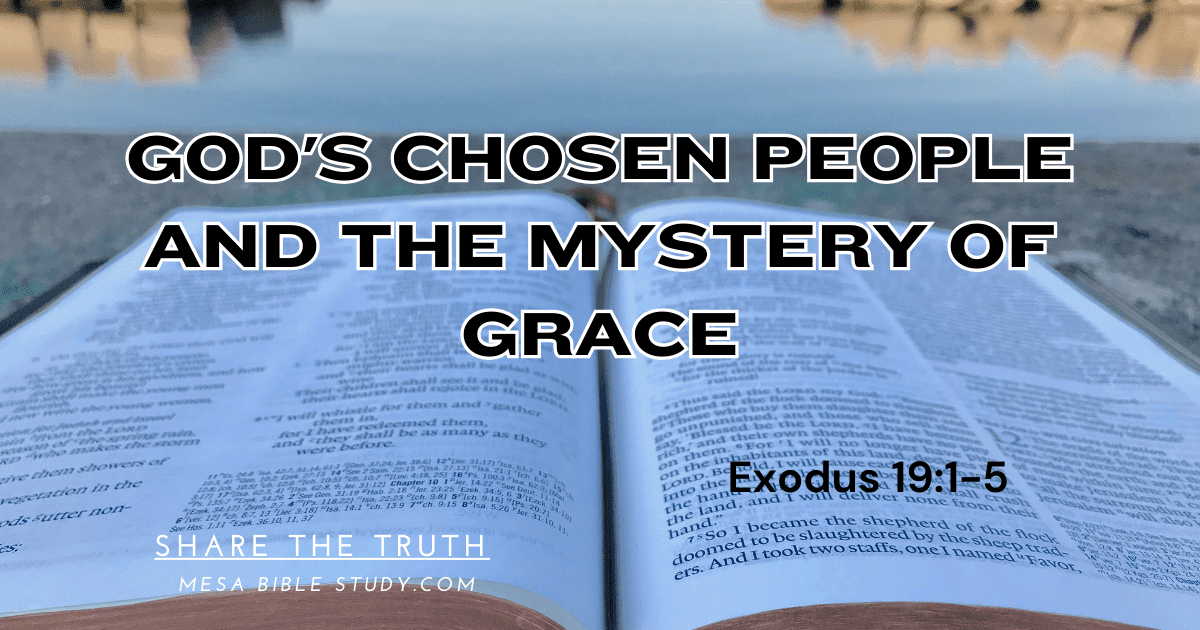In Exodus 19:1–5, we encounter a pivotal moment in biblical history, often subject to various interpretations over time. Nonetheless, it holds profound significance in understanding God’s divine plan. Here, God’s focus is unmistakably on the Israelites, His chosen people.
Verse 5 presents a distinct covenant with the nation of Israel, not the Gentile world: ‘Now, therefore, if you will indeed obey My voice and keep My covenant, then you shall be a special treasure to Me above all people; for all the earth is Mine.’ (Exodus 19:5)
This verse establishes a clear distinction, addressing the Israelites (not the Gentile world), freshly delivered from Egypt, and outlining a covenant. God’s promise to them is twofold: obedience and compliance with His covenant would set them apart as a ‘special treasure’ among all nations.
This moment in history is significant to emphasize. At this juncture, God’s focus is exclusively on the Israelites, His chosen people. They are intended to be a kingdom of priests, with the prospect of eventually sharing the knowledge of their God and the message of salvation with the pagan Gentile world.
Throughout the Old Testament, the four Gospels, and the early chapters of Acts, it cannot be overstated: that God’s covenant dealings were exclusively with Israel. It is of utmost importance to grasp this unyielding focus on Israel in the biblical narrative. To forcefully insert Gentiles into the promises and purposes designated for Israel is to fundamentally misinterpret God’s divine plan.
Here is just one of many examples that show that many chapters into the book of Acts specifically chapter 11, God is dealing with Jews only:
Now those who were scattered after the persecution that arose over Stephen traveled as far as Phoenicia, Cyprus, and Antioch, preaching the word to no one but the Jews only. ‘Acts 11:19
God’s plan of redemption for humanity is a meticulously progressive unfolding divine masterpiece, carefully unveiled according to His sovereign timetable. Notably, it remained veiled from earlier biblical characters such as Adam, Noah, Abraham, Moses, Daniel, and even Peter. The pivotal turning point in unveiling God’s eternal purposes arrived dramatically with the divine appointment of the apostle Paul around 37 AD. At this juncture, the ascended and glorified Lord Jesus Himself revealed to Paul the “Mystery” of the gospel of grace, a mind-boggling revelation that had been hidden until then. This monumental event marks the unsearchable riches of God’s plan of redemption, bringing clarity to His intricate design for the salvation of all, especially the Gentiles. Amazing!
The mystery of the gospel of grace revealed to the apostle Paul marks the profound culmination of the work of the cross. Beyond its victory over sin, Satan, the law, and death, this mystery unveils God’s eternal purposes. Israel’s initial rejection of their Messiah paved the way for this revelation (Romans 11:32). Since then, God has been pouring out His grace on all of humanity, not just the Jews. Salvation now comes by grace through faith in the finished work of the cross, apart from adherence to the Mosaic law, rituals, repentance, baptism for salvation, or temple worship. For over 1900 years, we’ve lived under grace, not the law.
In our examination of Exodus 19:1–5, we explore the sovereign design and framework of God’s chosen people, the Israelites, and the subsequent unveiling (the mystery) of His plan of salvation for all mankind. This divine plan extends beyond the initial boundaries of the Jewish nation, despite their temporary unbelief (Romans 11).

0 Comments